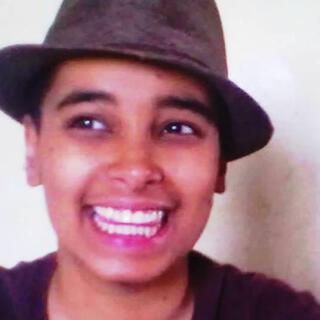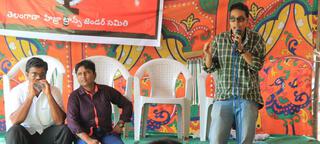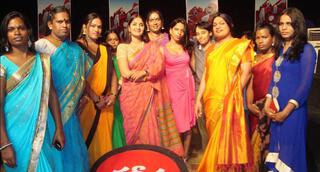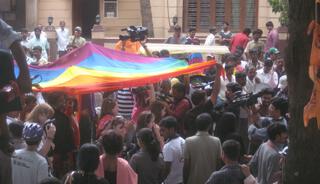The State of LGBT community in India: An interview with Dr. Karthik Bittu
Published on
Concern interviewed Dr. Karthik Bittu, currently a faculty member at University of Hyderabad. He completed his PhD from Harvard University and post-doctoral research at Centre for Ecological Sciences, IISc Bangalore. Bittu has been active in the struggle for equal rights of individuals from the Hijra, Kothi, and LGBMTI communities. In January 2014, he had been part of a panel discussion organized by Concern on IPC 377 - Judgement, Sexuality and Gender. Bittu loves music, forests and good food.
Just for the record, can you say something to the people who would still call LGBT - identity and behavior unnatural and / or immoral?

Well, as a biologist I can say that there’s a massive amount of documented evidence of the following in animals:
“transgender” behavior (behavior violating expected patterns given an animal’s genitalia), “same-sex” mating behavior (including in bonobo chimpanzees, the closest relatives of humans); inter-sex animals whose bodies don’t conform to male / female phenotype; “transitioning” animals such as angelfish whose bodies change gender over the course of their lives etc.
Even for particular sexual acts that the British called “unnatural” in their framing of laws like Section 377, for example, both fellatio and cunnilingus have recently been described in bats. People who want to know more about transgender / inter - sex variations in nature can read the American evolutionary biologist - Joan Roughgarden’s book, Evolution’s Rainbow.
When did you discover that you are L/G/B/T? How long did it take to come out to friends or family? Were you nervous?
I realized I was some combination of B/T when I was around 15. I was out to friends as soon as I realized this, and properly to family some years later when they asked me questions based on things I had said. I was never nervous.
What was their initial reaction? Have they become more accepting, over the years?
Their initial reaction was disbelief and denial, which has mostly not changed. But through everything, my parents never let me doubt their complete love and care for me; the only negative aspect of their reaction was how much pain they felt about having to deal with societal judgment. But things have definitely improved on that front.

Majority of the general public cannot understand what it feels like to be L/G/B/T. Can you give us a glimpse?
Being transgender is an experience of both physical and social discomfort and deep rooted unhappiness with one’s assigned gender and body. I sometimes ask people who are cisgender (i.e., not transgender) to imagine how they would feel if they woke up the next day in a differently gendered body or a body of the opposite sex. Not many people can imagine being in a body not conforming to one’s own brain’s expectations of what one’s body is; nor can people easily imagine being subjected to the massively different social expectations of people of the opposite gender.
In fact, social scientists understand gender as a social construct that is conventionally built up around sex, which is a more biological term describing bodies. Bear in mind that about 1 in 2000 children have bodies which doctors cannot unambiguously classify as male or female; such children are called ‘intersex’ as an umbrella term for many biological variations. Their socio-politicalstruggle should be more strongly advocated by the LGBT political movement. People who chose their own gender may also chose one of many gender identities beyond male or female.
While that has been about gender identity, being gay (a man attracted to men) or lesbian (a woman attracted to women) or bisexual (a person of any gender attracted to both genders) or multi-sexual (a person of any gender attracted to multiple genders) or pansexual (a person of any gender potentially attracted to people of any orall genders) - is about sexuality and not gender identity.
The primary experience of sexuality is one of enforced social shame, which is also faced by transgender people. But because shame is attached to sex outside one’s caste or religion or even pre-marital sex, more so for women than for men, this is an experience that is shared with many non-LGBT people who resist marriage or who enter into inter caste or inter religious relationships.
Volunteers of Telangana Hijra Transgender Samiti go on Discussion on The Rights of Transgender Persons Bill, 2014 @ TV9 Telugu – Naveena Programme. Bittu is seen in a grey shirt, fourth from the right.
Could you give us a glimpse of the discrimination LGBT individuals face in professional & personal lives on a daily basis?

In the Indian context, there’s a strong pressure to not talk about personal aspects of one’s lives. With respect to gender, you are expected to conform to social norms; with respect to sexuality, anything outside of marriage is strongly judged, even in professional contexts.
Transgender people who are openly transgender face almost complete exclusion from every sphere of employment - either due to discrimination or because of a mismatch between the way people look and the name / gender on their academic certificates. Their gender is questioned, policed and ridiculed several times every day, everywhere, from buses to bathrooms. Many (but not all) face outright rejection, physical and sexual violence from family and friends. This often leads to homelessness and exposure to even more violence on the streets, especially more so for transgender women for whom the only option remaining to feed themselves is by sex work.
Transgender men don’t have these options and work mostly in low paying jobs where young boys work, such as tea shops, etc. If they are not aware of transition procedures, they appear to be perennially young and have to keep changing their location every year or two to avoid being “outed” or being treated as women.
Transgender people whose families accept and love them can transition with less insecurity and violence. Sometimes society respects the privacy of the family; other times the entire family is placed under intense social scrutiny. Similar to Transgender individuals, many LGB people experience family violence and rejection, homelessness, street violence and also discrimination and ridicule because of not conforming to gender stereotypes. Lesbians specifically experience forced marriages, marital rape, and are often criminalized by their partner’s families with kidnapping charges when they run away with their partners.
The pressure is palpable and people’s disapproval is clear. That said, I can’t really dissect apart the considerable disapproval I personally face about being an activist, a communist, an Ambedkarite and a feminist apart from the disapproval around my gender and sexuality.
How was your interaction with others who identify as L/G/B/T? Did you feel a sense of fraternity that was missing with others who were non - LGBT? Or is it subtle-stereotyping to assume that you have more in common with them than the majority?
Yes, I think many LGBT people find an important sense of community and empathy with other LGBT people. Not that one automatically shares more with them than with other people; but how much one’s LGBT experience and stigmatization defines one’s life plays a huge role in how essential the LGBT community is for LGBT individuals.
For someone who has been kicked out of their home, who faced severe social and police pressure around their relationships, who finds it hard to make a living because of violating gender expectations in society - it is hard to find common ground or even a sense of understanding outside the LGBT community. This is especially true for hijras.
Other people with a more understanding family, friends and a less stigmatized existence around their identity, spend more time with friends and birth families and less time with the community.
Could you give us an overview of the social initiatives you took part in, to sensitize people about issues facing the LGBT community?
The list of protests I took part in, on these issues, would be quite long. Briefly speaking, I am part of a mass organization called Telangana Hijra Intersex and Transgender Samiti1, and we have organized in several ways over the last two years in Hyderabad, fighting atrocities and assaults upon the transgender community by goons, by the police and by the army; as well as protests asking for the implementation of the NALSA judgment and towards asserting the dignity of transgender and hijra individuals.
This is in addition to advocacy and education initiatives for the public, to fight police violence or complicity, and a lot of crisis intervention work. In Bangalore I am part of an LBT collective called LesBIT2 which works on support, advocacy and outreach especially for working class lesbians, bisexual women, transmen and their partners. Both organizations emphasize centering the LGBT “movement” around the working classes, with the dalit - bahujan - minority sections of the LGBT community taking a lead in organizing and setting discourse and policy. This is because the elite LGBT movement focuses limitedly on issues like Sec. 377 and gay marriage in a way that is insensitive to the many serious issues faced by working class and dalit-bahujan-minority LGBT people. Focusing on the leadership of the many more marginalized people leads to all these issues being taken up.
In addition to work with these organizations, we also organize the Transgender Day of Remembrance periodically in memory of the many transgender people who are murdered or commit suicide every year, as well as the annual gay pride.
Whose role do you see as most critical in a healthy acceptance of LGBT individuals? The individuals’ parents or friends or siblings?
Parents are the most critical especially in India. If parents accept a child, everyone in society accept the child themselves. Of course societal pressure can fall heavily upon the parents, but the child grows up relatively protected from ridicule.
If parents are seen as unsupportive, children are treated much worse by the society. Friends and siblings also play a huge role because people typically come out to them before coming out to parents, and their reaction can really affect the confidence of LGBT teens.
An estimated 1,000 participants rallied in Bangalore in 2009 celebrating the second annual gay pride parade.
About a handful of people at IISc identify themselves as L/G/B/T. Many of them are young and vulnerable. Could you say something to them?

When I first came to IISc, there were three of us who were open and out on campus. There had been a history of queer activism on campus and a group called Queer IISc existed even before we joined. We were able to slowly build the group and currently there are almost 50 people who are a part of the group.
So anyone from IISc who identify themselves as L/G/B/T should not at all feel alone on campus. They can email geekyqueers@gmail.com if they want to join the email group. They can also send a request to join the closed Facebook group (where no one outside the group can see them) called Queer IISc3, with a description of themselves and their identification within the LGBT spectrum.